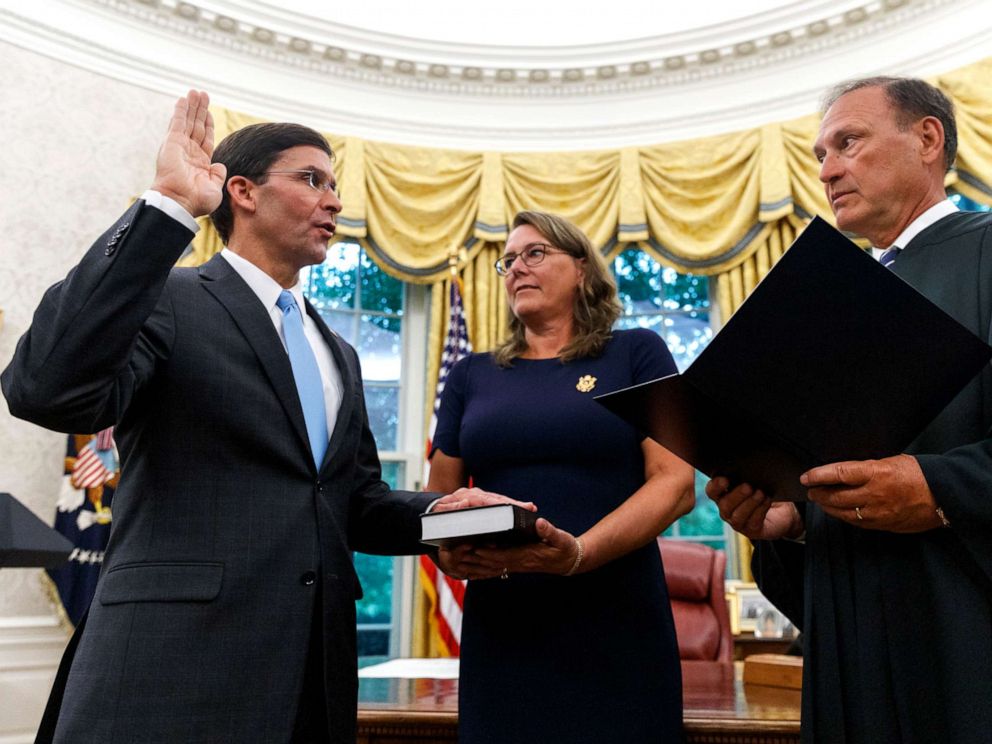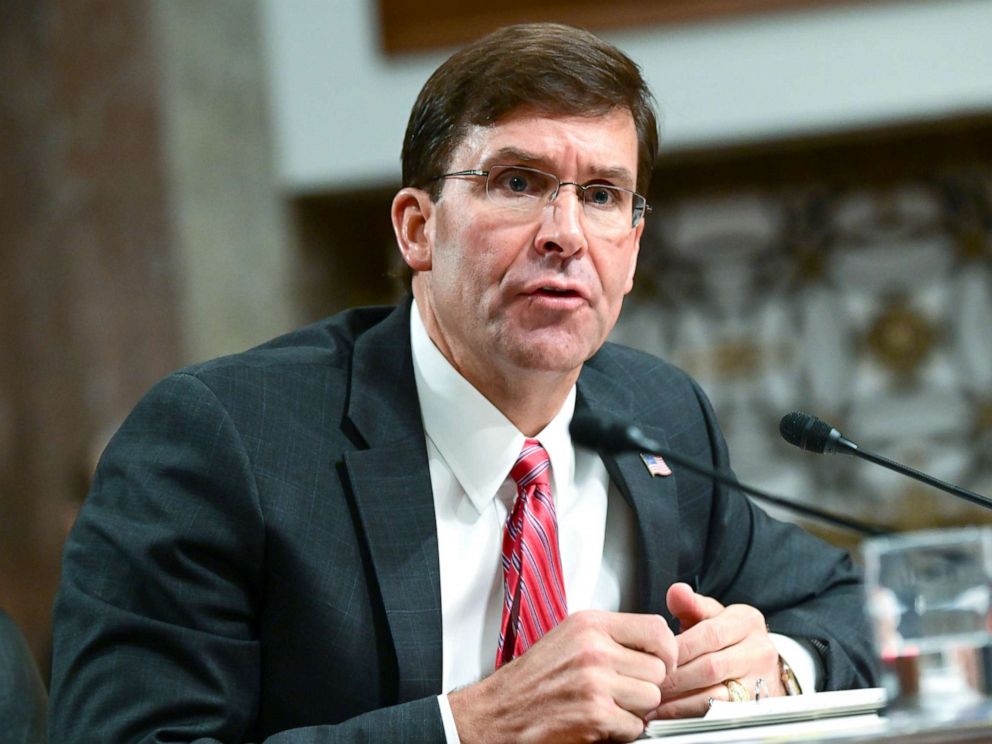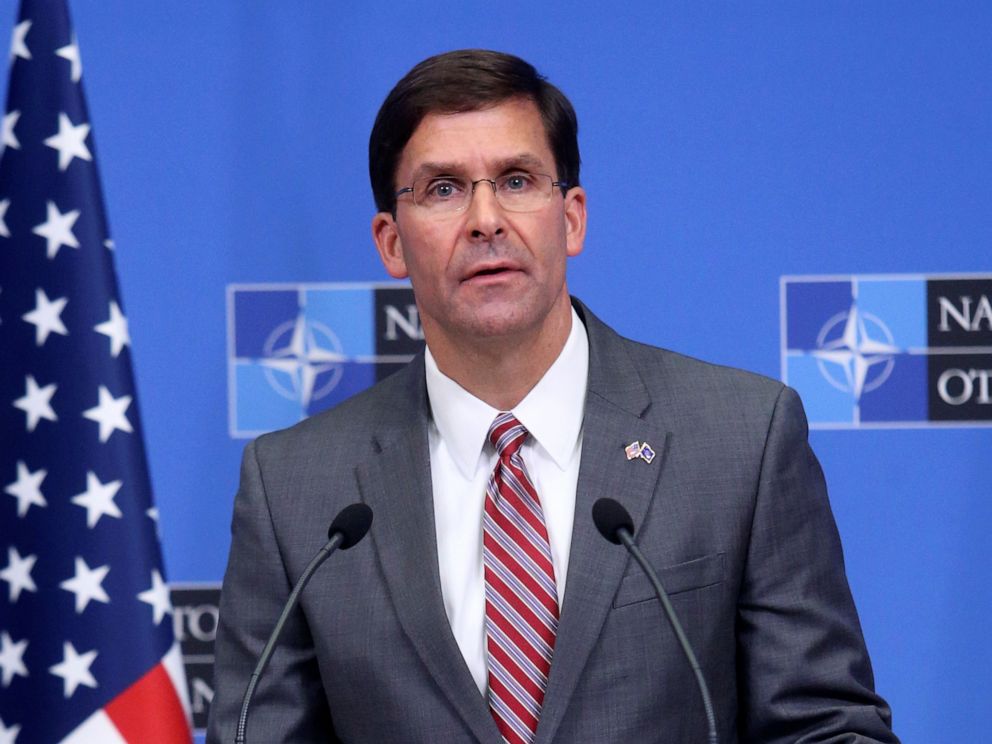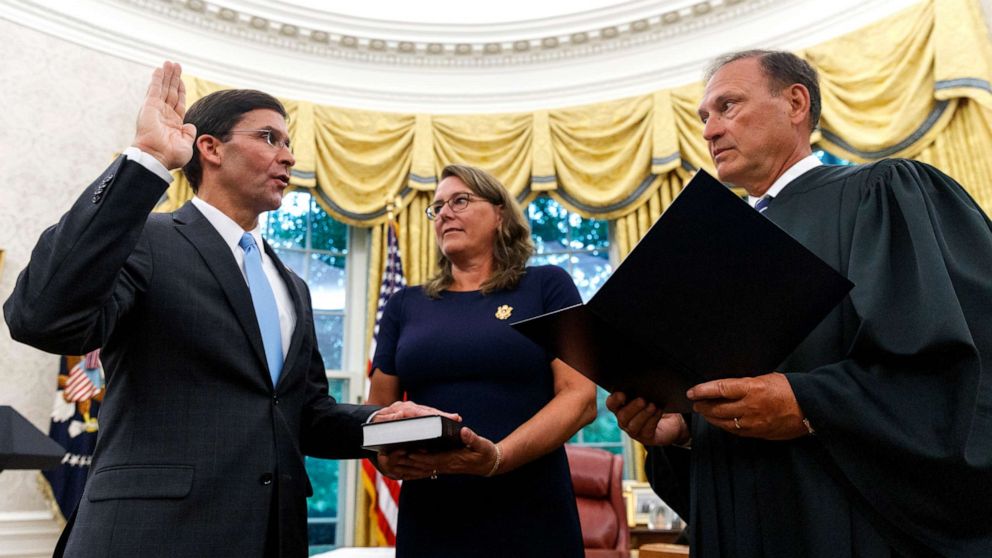[ad_1]
The Senate confirmed Mark Esper to be the next U.S. defense secretary in a overwhelmingly bipartisan 90-8 vote on Tuesday and he was sworn in by Supreme Court Justice Samuel Alito on Tuesday evening in an Oval Office ceremony attended by President Donald Trump, senior White House officials and 13 of Esper’s family members, according to the White House.
Interested in Trump Administration?
Add Trump Administration as an interest to stay up to date on the latest Trump Administration news, video, and analysis from ABC News.
Esper becomes the first individual to officially step into the role since former Defense Secretary James Mattis resigned in December over policy differences with the president. In the more than six months following Mattis’ resignation, three different men have served as defense secretary in an “acting” capacity.
 Carolyn Kaster/AP
Carolyn Kaster/AP
Secretary of State Mike Pompeo congratulated Esper on Twitter.
“Bridging diplomacy and defense are vital for U.S. foreign policy and to the protection of U.S. interests,” he tweeted. “Congratulations to Mark Esper on your confirmation as the new Secretary of @DeptofDefense. I look forward to working with you! #CourageNeverQuits”
Bridging diplomacy and defense are vital for U.S. foreign policy and to the protection of U.S. interests. Congratulations to Mark Esper on your confirmation as the new Secretary of @DeptofDefense. I look forward to working with you! #CourageNeverQuits
— Secretary Pompeo (@SecPompeo) July 23, 2019
The Senate moved to expedite Esper’s confirmation process before the August recess, amid a large number of vacancies in Pentagon leadership positions. The eight Democrats who voted against Esper’s confirmation included five presidential candidates: Sens. Cory Booker, Amy Klobuchar, Kristen Gillibrand, Kamala Harris and Elizabeth Warren.
Esper served as the president’s Army secretary and stepped into the role of acting defense secretary on June 24 after his acting predecessor, Patrick Shanahan, withdrew his name from nomination following reports of domestic violence in his family’s past.
 Erin Scott/Reuters
Erin Scott/Reuters
At his confirmation hearing before the Senate Armed Services Committee last week, Esper enjoyed broad, bipartisan support for the job but did face questions from several senators, including Warren, about his seven years as chief lobbyist for the defense company Raytheon and how that employment could present a conflict of interest.
In a heated exchange with Warren, Esper acknowledged that, if confirmed, he would not extend his recusal from Raytheon-related matters or commit not to work for or get paid by a defense contractor for four years after he leaves government.
He said that this decision was made at the advice of Department of Defense ethics officials because the screening process he has in place — which dictates how staff handle any issues that could present a conflict of interest — is sufficient. He added that he would continue to abide by DOD rules and regulations.
Esper graduated from West Point in 1986 — the same class as Secretary of State Mike Pompeo — and went on to serve in the Army for over a decade, including a deployment to the Middle East during the Gulf War.
 Francois Walschaerts/Reuters
Francois Walschaerts/Reuters
Before joining Raytheon, he spent a considerable amount of time on Capitol Hill as a Senate committee staffer and adviser to several senators. He was also the deputy assistant secretary of defense for negotiations policy during the Bush administration.
As Army secretary, Esper spent time with the president, traveling with him to an Abrams tank factory in Ohio and to the southern border amidst the deployment of active duty soldiers there.
Esper stepped into his role as acting defense secretary as the Trump administration was considering how to navigate increased tensions with Iran. And in late June, he attended a NATO defense ministerial in Brussels, urging U.S. allies to confront Tehran. The challenge remains top-of-mind for Pentagon leadership following a series of escalatory events in recent weeks between the U.S., its allies, and Iran in the Strait of Hormuz.
 Department of Defense
Department of Defense
During the confirmation process, Esper could not serve in his acting role, so Navy Secretary Richard Spencer assumed the duties of acting defense secretary after the White House submitted Esper’s formal nomination to the Senate. Meanwhile, Esper returned to serving as Army secretary.
His confirmation comes as a number of top Pentagon jobs have yet to be permanently filled, including the deputy defense secretary, chief management officer and Air Force secretary.
The Senate will now shift its focus to confirm David Norquist as deputy defense secretary. Norquist, who has been performing the duties of that role since January, will testify before the Senate committee on Wednesday.
[ad_2]
Source link

